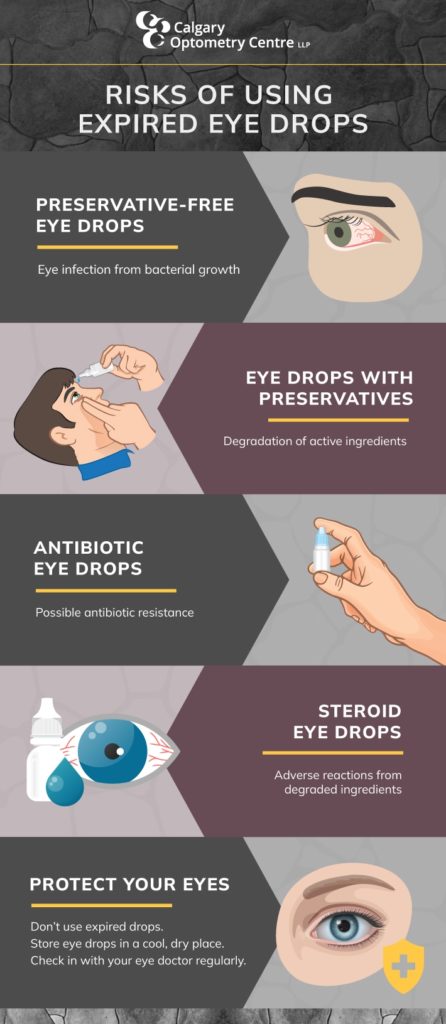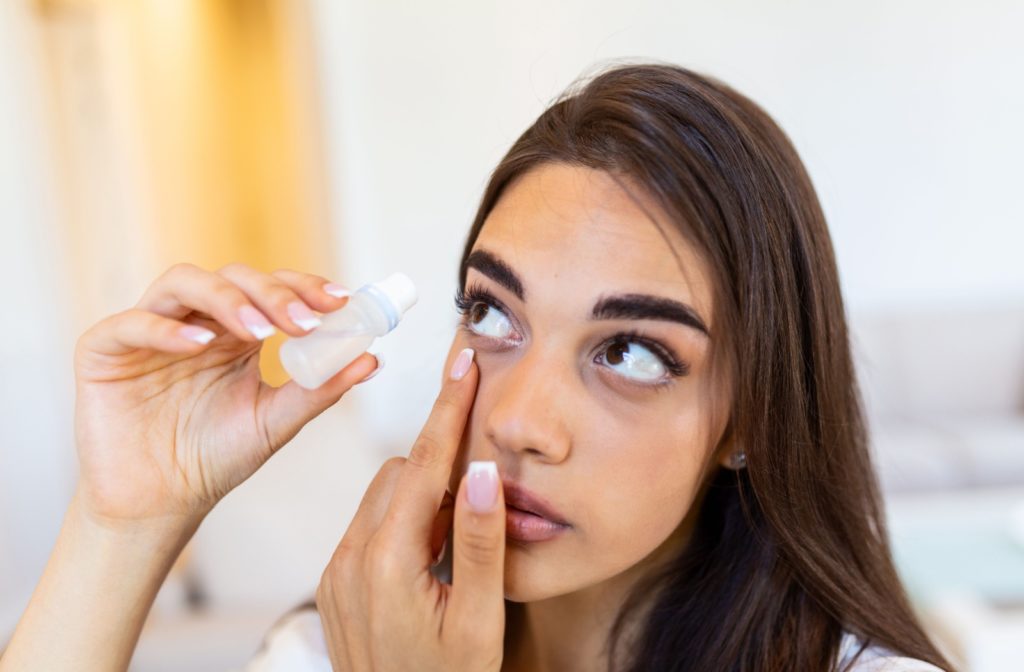Using expired eye drops may seem like no big deal, but the expiry date exists for a reason. With tight expiration dates on pharmaceutical products, it’s natural to question whether using that dusty bottle of eye solution is truly safe or if it’s better to err on the side of caution.
Typically, using expired eye drops won’t hurt you. But, over time, the preservatives and active ingredients in eye drops can break down and become less effective. There is potential for expired eye drops to be harmful if they begin to grow bacteria.
To prevent an infection or other eye health issue, it’s best to avoid using expired eye drops. Your eye doctor can provide more guidance on how long your specific eye drops are safe to use, depending on the type.
Why Do Eye Drops Expire?
Expiration dates are more than just arbitrary numbers—they’re a reflection of a product’s guaranteed efficacy until that time. In the case of eye drops, this is vital. Your delicate eye tissue needs a specific pH and a certain concentration of active ingredients to remain healthy. Over time, these factors can change, rendering the drops less effective or even harmful.
Factors Impacting Post-Expiration Efficacy
The potency of eye drops can be influenced by several things over time. Factors like exposure to light and air, as well as the quality of the preservatives, can play a role in the degradation of active ingredients. This can happen even before the stated expiration date, especially if the eye drops are stored improperly.
Types of Eye Drops
When assessing the viability of using expired eye drops, it’s crucial to distinguish between the different types available. The nature of each product can significantly influence how quickly it may degrade or become unsafe after its expiration date.
Preservative-Free Eye Drops
Preservative-free eye drops typically come in single-use vials and are recommended for individuals with sensitive eyes or those who use eye drops very frequently. The lack of preservatives means there’s nothing to inhibit the growth of bacteria once the vial is opened. Therefore, using these drops after their expiration date—or even after the vial has been open for a short time—is not advised due to the high risk of contamination and infection.
Eye Drops with Preservatives
Eye drops that contain preservatives are designed for longer use and can generally withstand being opened and used up to the expiration date printed on the bottle. The preservatives help prevent bacterial growth, making the drops safer to use for a longer period.
However, the chemical composition of the preservatives and active ingredients can still degrade over time. Using these drops long after their expiration could lead to reduced efficacy and potential risks to eye health.
Antibiotic Eye Drops
Antibiotic eye drops are specifically formulated to treat bacterial infections and have a much stricter usage and storage requirement to maintain their potency.
Using expired antibiotic eye drops can be particularly dangerous, as the decreased effectiveness could lead to inadequately treated infections and possibly even contribute to antibiotic resistance.
Steroid Eye Drops
Steroid eye drops are another category where the risks of using expired products can be significant. These drops often treat inflammation and must remain potent and uncontaminated to prevent exacerbating the condition they were prescribed for.

Why Do Expiry Dates Matter for Eye Health?
Using expired eye drops could exacerbate an existing eye condition rather than treat it. For example, if you’re dealing with conjunctivitis (pink eye) or allergies, you want to be sure that your medication can fight the infection and alleviate symptoms effectively.
Will Expired Eye Drops Still Work?
The efficacy of eye drops after their expiration date can vary. Active ingredients can become less potent, leading to a reduced or ineffective treatment. This is particularly true for prescriptions that contain antibiotics or steroids, as their activity levels decline.
Potential Consequences of Using Expired Eye Drops
The risks of using expired eye drops may vary from mild, such as experiencing little to no relief from symptoms, to severe, like developing an eye infection or causing damage to the cornea. Additionally, the inactive ingredients in the drops can also pose a risk as they deteriorate over time, potentially leading to an adverse reaction.
Determining If Expired Eye Drops Are Still Safe
You can perform a visual check of the eye drop solution. If it has changed colour or consistency, it may be spoiled and should not be used. However, not all signs of degradation are visible, so relying solely on a visual inspection is not foolproof.
The most reliable course of action when dealing with eye drops you’re unsure about is to consult with an eye care professional. They can advise you on whether it’s safe to continue using the drops or if you should dispose of them.
Proper Storage & Handling of Eye Drops
To protect the longevity of your eye drops, store them according to the manufacturer’s instructions. This often means keeping them in a cool, dark place and ensuring that the cap is replaced tightly after each use. Avoiding direct sunlight and extreme temperatures can help preserve the product’s integrity.
Get Eye Health Advice at Calgary Optometry Centre
While using expired eye drops may pose no risk to some individuals, they could lead to significant health concerns for others. The consensus is clear: it’s best to exercise caution and prioritize your eye health. If you’re unsure about the efficacy of your eye drops, reach out to your eye doctor for advice. By connecting with a qualified eye care professional, you can take steps to protect your eye health and make sure your eye drops are as effective as possible. Book your appointment online with Calgary Optometry Centre today.




